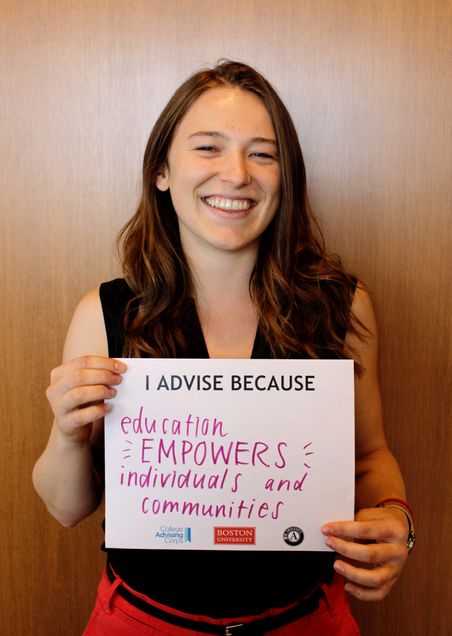This post is part of our #BUandBoston series, highlighting the work and research of BU students, faculty, and staff throughout the City of Boston. Interested in having your Boston-related work featured? Tag us on Instagram or Twitter @BUonCities using the #BUandBoston or send us an email at ioc@bu.edu.
By: Douglas Darrah
When Alicia Huerta was looking for a post-graduation job last spring, one opportunity stood out to her more than all the others. Huerta explained that working for the Boston University branch of the College Advising Corps positions her “to give back and to help the same group of students that [she] fit into when [she] was in high school.” That opportunity “just kind of overshadowed any other position that [she] was looking at.”

CAC-BU is part of a national organization that Dr. Nicole Hurd founded in 2005. CAC expanded to Boston in 2013, beginning its partnership with Boston University in 2015. Every year, they help thousands of students tour college, take the SAT, navigate the Common App, apply for financial aid, and access other resources that they may need.
Students need those skills now more than ever. Unless a student has professional support, the college application quickly becomes overwhelming. After a student takes the PSAT, Huerta points out that “if you’re not familiar with it… you might not necessarily understand the weight of the score whether it’s good or bad.” Students may not also know that they have to cultivate relationships with teachers who can write them recommendation letters. Applying for scholarships and financial aid is an equally nightmarish process. CAC advisers help students stay organized and in control throughout this stressful time.

Their mission does not, however, end once students submit their applications. Advisers focus on ensuring that their mentees can both get into and succeed in college. Katie Hill, the director of CAC-BU, notes that “part of our model is having students apply to colleges that fit them well, that they can afford, and that match their interests and skills.” They help them develop skills that include writing clearly, organization, and self advocacy.
One of CAC-BU’s distinguishing features is that it employs “near-peer mentors.” None of their counselors have been out of school for more than two years. 83% of them are people of color, first-generation college students, or Pell Grant eligible themselves. Huerta considers this to be a benefit: “I have been through [the college application process] so recently that I can speak from my own experience.”
It also helps the counselors build relationships with the students in their one-on-one sessions.  Another advisor, Hannah Weber, expressed: “That’s my favorite part of the job; just talking with them and getting to know them. Every one-on-one surprises me and all the students are so unique and special.” Weber has managed to build a close, informal rapport where they feel comfortable: students “just poking their head in and asking ‘Miss, what does this mean? Miss, when’s the deadline for this?’”
Another advisor, Hannah Weber, expressed: “That’s my favorite part of the job; just talking with them and getting to know them. Every one-on-one surprises me and all the students are so unique and special.” Weber has managed to build a close, informal rapport where they feel comfortable: students “just poking their head in and asking ‘Miss, what does this mean? Miss, when’s the deadline for this?’”
CAC-BU’s track record of success is documented by the data that they diligently collect. Schools in which CAC-BU has a presence see, on average, a 7% increase in college enrollment. 74% of CAC-advised students persist from their first to their second year, 5% more than the national average. That difference is, for the advisors, what makes their job worthwhile.
CAC-BU is currently accepting applications to join the 2020-21 college advisor cohort. For more information, contact CAC-BU at cacbu@bu.edu.
